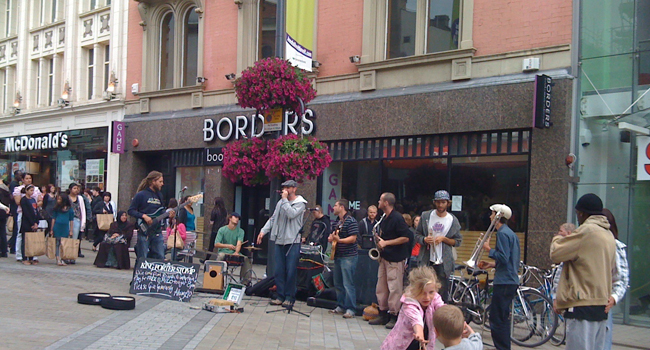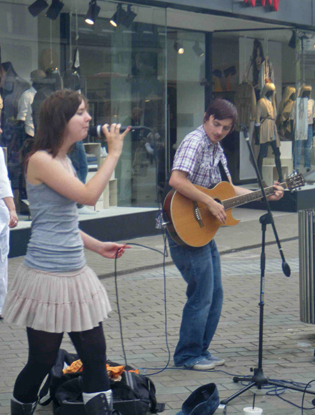“All technology is neutral”. This was the essence of a keynote speech given by Sir Ken Robinson (@SirKenRobinson), via Skype from his home in California, to a packed out auditorium at York Theatre Royal.

Sir Ken Robinson addresses the audience at Shift Happens 2010
The speech came at the end of the opening day of the third annual Shift_Happens event, the brainchild of Pilot Theatre’s Artistic Director, Marcus Romer (@MarcusRomer). Inspired by Romer’s experiences at TED, Shift_Happens draws people together from across the cultural and creative industries (the arts, media and film, museums and libraries, and so on) to talk about how they can take part in, and drive the digital landscape. The event includes a series of speeches, covering areas of both digital practice and policy, as well as performances, user testing of new digital and interactive media works, and surgeries giving new arrivals to the conversation insight into the digital landscape.
We were very pleased to attend Shift_Happens on behalf of Hyper Island, who we work with lots, and who are working with Skillset and Screen Yorkshire on a new leadership programme for Yorkshire’s digital and creative workforce. Our mission was to find out what is making people in the arts tick when it comes to digital.
The keynote will be available to view online in the coming weeks, so I won’t summarise here (we will provide a link once available). To be honest, I’m not sure where I’d begin anyway: it moved back and forth between the earliest developments of technology, and predictions about where we might be heading. What I can summarise, though, is the thesis: that technology, historically, has shaped the condition of society and its cultures. In that process, technology has promoted ways of living (urbanisation, for example) that push us away from nature, and each other. However, the truth of the matter is that technology is not actively working towards these ends: it is not looking to drive the wedge. Indeed, technology is only ever passive – “all technology is neutral”. What matters, then, is how we use technology. If we use it responsibly then it will promote creativity and spiritual wellbeing. If we don’t then we could be in trouble.
Sir Ken’s keynote followed another presentation (part speech, part crowd-souring performance lecture) by Andy Field, Artistic Director of Forrest Fringe Festival (a free festival phenomenon that landed at the Edinburgh Fringe a few years ago).
 Andy Field, of Forrest Fringe Festival, talks to Director of National Theatre Wales, John E McGrath
Andy Field, of Forrest Fringe Festival, talks to Director of National Theatre Wales, John E McGrath
By accident or design, Field’s speech set a clear context for Ken Robinson’s keynote, and made it’s own call for a reconsideration of how technology is used by artists, to affect change: paraphrasing… “digital is a field that we are all, as artists and creative people, right at the forefront of: even if we were, in many ways, the last to arrive at the party. Rather than using technology to re-use existing ideas and content, we should be using our art to rip the heart from technology. We should bring art and technology together to dream stupid, impossibly grand visions of what the future might look like… It is true that no one can break the Internet, but we should all be trying.
So, to end where I began (or, rather, where Sir Ken began), all technology is neutral. It is passive, non-political, non-destructive. What activates technology is us, and it is up to us to determine its uses and by extension the shape of tomorrow’s society. That all seems simple, doesn’t it? Well, not if you skip back to the middle of Sir Robinson’s presentation when he shared a prediction: that by 2050 the average personal computer will have the same processing power as all of human consciousness. Machines that think, and learn, and re-write their operating systems based on their experiences. Will technology still be neutral then?
While you ponder that one the team at Hyper Island are heading off to buy copies of the Sarah Connor Chronicles, and here at Hebe we're getting started on the bunker.
 Monday, September 27, 2010 at 11:23AM
Monday, September 27, 2010 at 11:23AM 







